Teacher Insights on Developing Competency-Based Practices in the Classroom
CompetencyWorks Blog
In the last of a four-part series, Tommy Wolfe shares how he has adopted competency-based practices in his high-school science classroom. His first and second blog posts address how competencies influence teacher practice and his third post focuses on scaffolds for student agency.
I am a high school science teacher who is passionate about competency-based education, and although the school that I teach in is not competency-based, I have worked to develop competency-based practices with my PLCs (professional learning communities) and in my own classroom. In this blog post, I will share several structures I have found helpful in developing my own capacity for competency-based teaching.
Competency-based education is a system of multiple principles that seek to transform the traditional system of education. In this post, I discuss how I have evolved my teaching towards the following principles of competency-based education:
- Explicit, transparent, measurable, and transferable learning objectives
- Flexible pacing and differentiated support
- The authentic application of knowledge
Proficiency-Based Assessment
Although the high school that I teach at is not competency-based, we do use proficiency-based assessment and standards-based grading using a typical 1 – 2 – 3 – 4 scale.

In the science department, our standards are the Next Generation Science Standards (NGSS) Scientific Practices. If your school does not currently utilize proficiency-based assessment, I know of many instances of teachers or departments piloting this mode of assessment in their own classes.
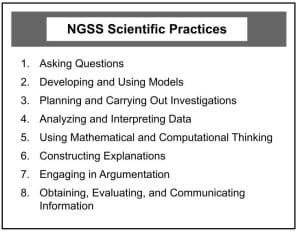
This assessment framework has two important features that support competency-based practices: (1) mastery is defined by specific indicators, and (2) skills are the standards that are assessed.
When first adopting proficiency-based assesssment, we had some standards with less explicit indicators. As my team has developed clear indicators for skills, we have been able to more clearly communicate expectations for students, better break down and teach a skill, and provide more effective feedback. Additionally, students can more easily self-assess.
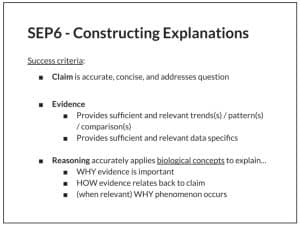
Teaching both content and skills with the scientific practices as our standards cultivates for students a more relevant and needed knowledge base to critically think about and do science. Assessing skills also aids in providing more flexible pacing and differentiated support. The skills we use as our reporting standards repeat themselves throughout the course, so a student who needs more time for Planning Investigations in one unit can continue to improve upon this skill in the next unit.
Flexible Pacing and Differentiated Support
Offering leveled practice and developing the criteria for Exceeds (Level 4) options have helped me to differentiate support and allow for flexible pacing. Although developing new criteria and additional scaffolds for agency is considerable work, it is extremely worthwhile when it motivates students to intrinsically push themselves to higher levels and you clearly see the satisfaction and confidence they gain from succeeding.
Leveled Practice
I learned the structure of creating Leveled Practice from a group of Westminster Public Schools teachers when attending the Westminster Public School Competency-Based Summit in Colorado a few years ago. A leveled-practice packet allows all students to work towards the same concept and skill, but at different levels of competence. The packet (1) provides clear examples for each competency level, (2) meets students where they are with the proper scaffolds, (3) encourages students to self-assess their current understanding, and (4) allows students to choose the level they believe is appropriate. Examples from my leveled practice packet for Mathematical Reasoning with Forces are shown below.
Figures 4.a-d: Examples of Leveled Practice
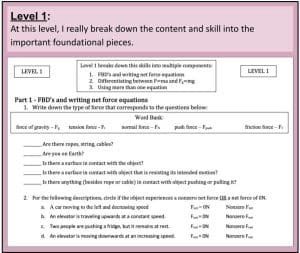
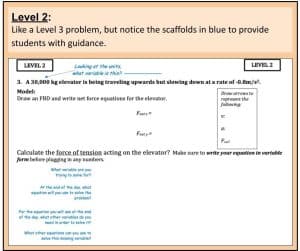
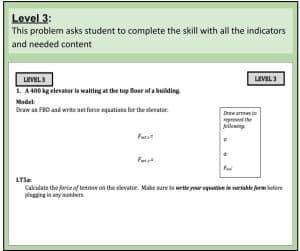
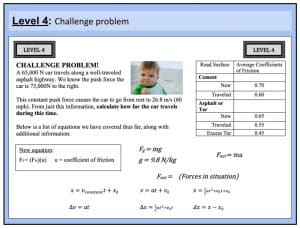
Developing Authentic, Rigorous “Exceeds” Opportunities
In competency-based education, students can move on once they’ve met mastery, but they also have the option to pursue Exceeds (Level 4) experiences, and over the past couple of years I have worked to expand opportunities for genuine, rigorous Exceeds experiences for my students. To support deeper levels of skill development, the expectations for Exceeds (Level 4) contain the same indicators for Mastery (Level 3), but with additional indicators that add rigor, as illustrated below.
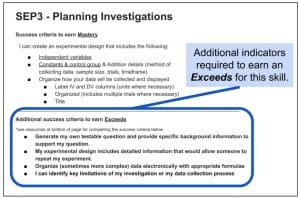
Incorporating more authentic projects, often as a replacement for in-class tests, has been essential for encouraging Exceeds opportunities. Projects provide flexible time for students to learn and demonstrate the additional Exceeds indicators, afford me time to hold mini-lessons to support students at different levels, and give students time to first reach Mastery (Level 3) so they can continue to challenge themselves by striving for an Exceeds. I have found that the better the scaffolding and resources I provide for Exceeds opportunities, the more students attempt and accomplish them.
Authenticity
The authentic application of knowledge is essential for competency-based education, and I argue that ensuring that students experience this element requires a curriculum deliberately driven by the enduring understandings and aims of academic disciplines. This has been the most vital and profound transformation for me as a teacher working to build my capacity for competency-based teaching, and I owe much of this to the competency-based educators that I conversed with as part of my doctoral research.
Instead of framing my curriculum by content units, units are framed by enduring understandings for what I want my students to develop. For my freshman biology course I want students to develop their scientific literacy (the NGSS scientific practices) to:
- Make informed personal decisions for a good, fulfilling life
- Act with a cooperative, sustainable mindset
- Live with an understanding of how we became us (as individuals and as a species)
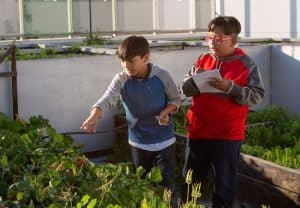
To provide an example, the question: How does growing food impact us? drives our inquiry for the first unit. This purposefully ambiguous question invites students to explore it on multiple levels: (1) self-reliance, (2) health and nutrition, and even (3) societal inequality and community empowerment. Students now grow their own food, explore soil and worm composting, build and investigate hydroponics, and learn recipes with the food they’ve grown. In the past, this would have just been the Photosynthesis Unit. The biological content is still covered, but in a much more authentic, empowering context.
Enduring understandings provide authentic context, but to authentically apply knowledge students need to, well…authentically apply knowledge. I have found incorporating more project-based performance tasks rather than in-class, paper-and-paper pencil tests has been crucial for this, and my own action research has found that students find these projects to be more fun and less stressful.
Competency-based education is ultimately a schoolwide endeavor, but I believe that teachers can also build grassroots momentum and develop their own capacity towards competency-based education. While there are still many areas for me to learn and grow in developing my capacity, I hope readers gain encouragement and specific strategies for building their own capacity for competency-based education. I believe these structures and strategies have improved my teaching practice and they have also made teaching more fun and a richer experience.
Learn More
- Competencies Help Bridge the Gap Between Traditional and Project-based Learning
- How Competencies Influence Teacher Practice
- Scaffolds for Student Agency
 Tommy Wolfe is a high school science teacher at Adlai E. Stevenson High School in Lincolnshire, IL and is an Adjunct Professor acting as the Competency-Based Lead for DePaul University’s Office of Innovative Professional Learning in Chicago, IL. He holds a B.S. in Integrative Biology, a B.S. in Psychology, an M.Ed in Curriculum and Instruction from the
Tommy Wolfe is a high school science teacher at Adlai E. Stevenson High School in Lincolnshire, IL and is an Adjunct Professor acting as the Competency-Based Lead for DePaul University’s Office of Innovative Professional Learning in Chicago, IL. He holds a B.S. in Integrative Biology, a B.S. in Psychology, an M.Ed in Curriculum and Instruction from the